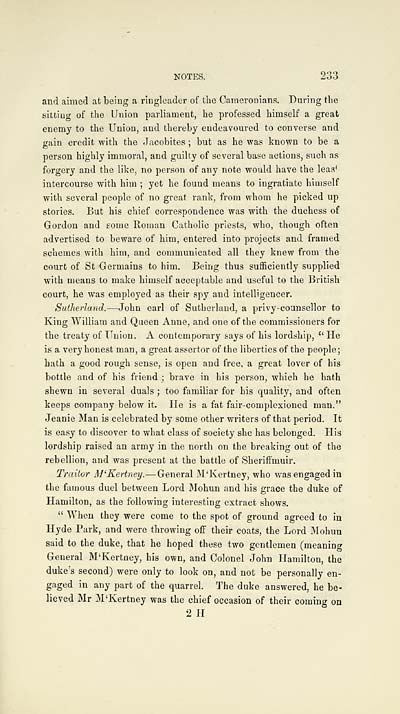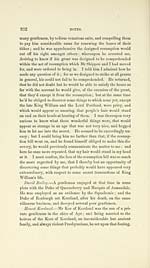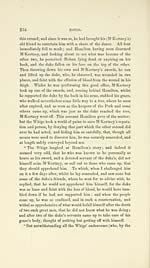Glen Collection of printed music > Printed music > Jacobite relics of Scotland > [First series]
(257) Page 233
Download files
Complete book:
Individual page:
Thumbnail gallery: Grid view | List view

NOTES. 233
and aimed at being a ringleader of the Cameronians. During the
sitting of the Union parliament, he professed himself a great
enemy to the Union, and thereby endeavoured to converse and
gain credit with the Jacobites ; but as he was known to be a
person highly immoral, and guilty of several base actions, such as
forgery and the like, no person of any note would have the leaa'
intercourse with him ; yet he found means to ingratiate himself
with several people of no great rank, from whom he picked up
stories. But his chief correspondence was with the duchess of
Gordon and some Roman Catholic priests, who, though often
advertised to beware of him, entered into projects and framed
schemes with him, and communicated all they knew from the
court of St Grermains to him. Being thus sufficiently supplied
with means to make himself acceptable and useful to the British
court, he was employed as their spy and intelligencer.
Sutherland. — John earl of Sutherland, a privy-counsellor to
King William and Queen Anne, and one of the commissioners for
the treaty of Union. A contemporary says of his lordship, " He
is a very honest man, a great assertor of the liberties of the people;
hath a good rough sense, is open and free, a great lover of his
bottle and of his friend ; brave in his person, which he hath
shewn in several duals ; too familiar for his quality, and often
keeps company below it. He is a fat fair-complexioned man."
Jeanie Man is celebrated by some other writers of that period. It
is easy to discover to what class of society she has belonged. His
lordship raised an army in the north on the breaking out of the
rebellion, and was present at the battle of Sheriffmuir.
Traitor M'Kertney. — General M'Kertney, who was engaged in
the famous duel between Lord Mohun and his grace the duke of
Hamilton, as the following interesting extract shows.
" When they were come to the spot of ground agreed to in
Hyde Park, and were throwing off their coats, the Lord Mohun
said to the duke, that he hoped these two gentlemen (meaning
General M'Kertney, his own, and Colonel John Hamilton, the
duke's second) were only to look on, and not be personally en-
gaged in any part of the quarrel. The duke answered, he be-
lieved Mr M'Kertney was the chief occasion of their coming on
2 H
and aimed at being a ringleader of the Cameronians. During the
sitting of the Union parliament, he professed himself a great
enemy to the Union, and thereby endeavoured to converse and
gain credit with the Jacobites ; but as he was known to be a
person highly immoral, and guilty of several base actions, such as
forgery and the like, no person of any note would have the leaa'
intercourse with him ; yet he found means to ingratiate himself
with several people of no great rank, from whom he picked up
stories. But his chief correspondence was with the duchess of
Gordon and some Roman Catholic priests, who, though often
advertised to beware of him, entered into projects and framed
schemes with him, and communicated all they knew from the
court of St Grermains to him. Being thus sufficiently supplied
with means to make himself acceptable and useful to the British
court, he was employed as their spy and intelligencer.
Sutherland. — John earl of Sutherland, a privy-counsellor to
King William and Queen Anne, and one of the commissioners for
the treaty of Union. A contemporary says of his lordship, " He
is a very honest man, a great assertor of the liberties of the people;
hath a good rough sense, is open and free, a great lover of his
bottle and of his friend ; brave in his person, which he hath
shewn in several duals ; too familiar for his quality, and often
keeps company below it. He is a fat fair-complexioned man."
Jeanie Man is celebrated by some other writers of that period. It
is easy to discover to what class of society she has belonged. His
lordship raised an army in the north on the breaking out of the
rebellion, and was present at the battle of Sheriffmuir.
Traitor M'Kertney. — General M'Kertney, who was engaged in
the famous duel between Lord Mohun and his grace the duke of
Hamilton, as the following interesting extract shows.
" When they were come to the spot of ground agreed to in
Hyde Park, and were throwing off their coats, the Lord Mohun
said to the duke, that he hoped these two gentlemen (meaning
General M'Kertney, his own, and Colonel John Hamilton, the
duke's second) were only to look on, and not be personally en-
gaged in any part of the quarrel. The duke answered, he be-
lieved Mr M'Kertney was the chief occasion of their coming on
2 H
Set display mode to: Large image | Transcription
Images and transcriptions on this page, including medium image downloads, may be used under the Creative Commons Attribution 4.0 International Licence unless otherwise stated. ![]()
| Special collections of printed music > Glen Collection of printed music > Printed music > Jacobite relics of Scotland > [First series] > (257) Page 233 |
|---|
| Permanent URL | https://digital.nls.uk/91269883 |
|---|
| Shelfmark | Glen.194 |
|---|---|
| Additional NLS resources: | |
| Attribution and copyright: |
|
| Description | Being the songs, airs, and legends, of the adherents to the house of Stuart. Collected and illustrated by James Hogg. Edinburgh: Printed for William Blackwood, 1819-1821. [First series] -- second series. |
|---|---|
| Shelfmark | Glen.194-194a |
| Description | Scottish songs and music of the 18th and early 19th centuries, including music for the Highland bagpipe. These are selected items from the collection of John Glen (1833 to 1904). Also includes a few manuscripts, some treatises, and other books on the subject. |
|---|
| Description | The Glen Collection and the Inglis Collection represent mainly 18th and 19th century Scottish music, including Scottish songs. The collections of Berlioz and Verdi collected by bibliographer Cecil Hopkinson contain contemporary and later editions of the works of the two composers Berlioz and Verdi. |
|---|

